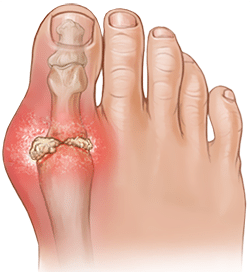What is Gout?

When someone refers to gout, they are referring to a common and complex form of arthritis. This condition can affect anyone. Patients often describe it as severe pain, swelling, and tenderness of the joints. Most often this is located at the base of the big toe, causing foot pain.
When a gout attack occurs it’s sudden, and typically wakes you in the middle of the night. The sensation has been described as a feeling as if it’s on fire. The joint that it affects will be tender to the touch, hot and swollen. Pain is often felt as so severe that it is intolerable. Symptoms will come and go but it’s best to manage symptoms for prevention.
Symptoms of Gout
It’s most common for symptoms to occur during the night and always happen suddenly. These symptoms are as follows:
- Severe joint pain. Although gout is most commonly occurs in the big toe, it can affect any joint. The pain is most likely to be the most intense within the first 4-12 hours after onset.
- A discomfort that lingers. Although the severe joint pain will eventually subside, there will be some discomfort that can last a few days to a few weeks. Attacks will begin to become longer and affect more joints in the future.
- Limited range of motion. This occurs as a progression. You eventually may not be able to move your joints as you once did.
- Joint redness and inflammation. It’s normal for gout to affect your joints and for them to become swollen, red, warm, and tender.
What Causes the Condition?
Gout occurs when urate crystals accumulate in the joint. Therefore, causing inflammation and severe pain. And when urate crystals occur you have high levels of uric acid in your blood.
When your body produces uric acid it then breaks down into purines. These purines are substances that are naturally found in your body.
However, these substances are also in certain foods and drinks, such as:
- steak
- organ meats
- seafood
- alcoholic beverages
Typically the uric acid will dissolve in your blood and pass through your kidneys into your urine. But our bodies sometimes procedure too much uric acid. Therefore, creating uric acid build-up. Then, forming sharp crystals in a joint, causing pain, inflammation, and swelling.
Gout Treatment
The treatment of gout involves medications. Depending on your current health your physician will determine which one is right for your gout treatment.
Medication for this condition will treat attacks and also prevent future attacks. However, they can also help to reduce the risk of complications that occur.
Medications for Treatment
Specific medication can help to treat acute attacks and in the prevention of an attack, such as:
- Anti-inflammatory medications such as NSAIDs. These include over the counter medicine, such as Ibuprofen, and naproxen sodium, prescribed prescriptions.
- Colchicine is a pain reliever that helps to reduce gout pain. This medicine does come with side effects, speak with your doctor ahead of time.
- Corticosteroids such as prednisone, control gout inflammation, and pain. Sometimes, they are in pill form or through corticosteroid injections into the joint.
If you are experiencing joint pain, call us at 888-409-8006. Our physicians are here to help! We offer offices throughout South Florida.
